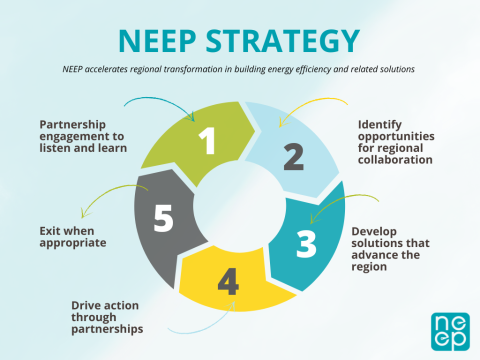
Northeast Energy Efficiency Partnerships (NEEP), founded in 1996, is a non-partisan non-profit that works to accelerate energy efficiency across the Northeast and Mid-Atlantic region including Delaware, the District of Columbia, Connecticut, Maine, Maryland, Massachusetts, New Hampshire, New Jersey, New York, Pennsylvania, Rhode Island, Vermont, and West Virginia. For nearly 30 years, NEEP has convened policymakers, industry, contractors, utilities, program administrators, and communities to transform the energy efficiency market with a collaborative, regional approach.
Vision: We envision the region’s homes, buildings, businesses, and communities transformed into efficient, affordable, low-carbon, resilient places to live, work, and play.
Mission: NEEP drives regional collaboration and best practices in energy efficiency so the Northeast and Mid-Atlantic region can lower energy bills, reduce air and carbon pollution, create jobs, and improve energy and climate resilience.
2030 Strategic Plan Pillars
| The region prioritizes energy efficiency as a key component to energy affordability, energy planning, and economy-wide emissions reductions to achieve consistent all-fuel emissions reductions with a focus on approaches that reduce energy burden. | |
| The regional market shifts to primarily efficient, electric building and transportation technologies with an emphasis on both co-promotion with energy efficiency and uptake in underserved communities. | |
| States and utilities implement policies and programs that enable homes, buildings, and vehicle charging to serve as flexible load when and where the grid needs the resources. | |
| The region supports a highly qualified energy efficiency and heat pump workforce that reflects the communities they serve. |
Approach: Most of the solutions to make our homes and businesses energy efficient and low carbon are available now. The challenge is to rapidly scale these technologies, policies, and program models to support long-term goals. Across all four of our 2030 pillars, NEEP advances a more energy-efficient and sustainable regional economy by ensuring the successful implementation of:
Strong policies and regulations to address market barriers and reduce energy and emissions from homes and businesses, including advanced building codes, appliance efficiency and emissions standards, energy efficiency resource standards, buildings and industrial energy efficiency programs, electrification goals, building benchmarking and performance standards, clean heat standards, and energy equity requirements for program administrators.
Market transformation strategies for energy efficiency and electric space and water heating, including innovative program models that activate consumer demand, midstream approaches that drive contractor and distributor participation, and workforce development that prioritizes a qualified and inclusive workforce.
Community-led solutions that include replicable program models for local government leaders, strategies to improve efficiency in multifamily affordable housing, community transportation planning, community cohorts for building benchmarking, electrification, and locally-driven workforce development programs.
Across the Northeast and Mid-Atlantic, NEEP pursues these policies, regulations, market transformation strategies, and community-led solutions through the following approaches:
Technical Assistance and Research-Informed Advocacy: NEEP provides one-on-one technical assistance to state and local partners and works through cohort models, in which NEEP convenes and supports groups that are linked by geography or topic. Both models are needed to drive change more rapidly. Regional consistency can transform the market and is suited to a faster rate of progress. At the same time, state and local conditions vary and much support requires customization to unique policy environments. NEEP serves as a technical expert – and brings other technical experts to the table – to provide information, briefings, models, opportunities for peer-learning, and connections to more customized technical assistance where needed.
Analysis, Tools, and Research: NEEP conducts independent analysis and develops actionable toolkits, web-based resources, online policy and program trackers, case studies, and reports to support and advance regional initiatives that drive innovative solutions. NEEP focuses on developing resources driven by partner priorities and dissemination of these resources - getting them into the hands of the organizations that need them, when they need them - so that they can act.
Stakeholder Engagement and Collaboration: NEEP has a long track record of developing cross-sector, cross-jurisdiction partnerships and bringing stakeholders together to develop, advance, accelerate, and integrate solutions that advance energy efficiency. NEEP uses virtual and in-person engagement opportunities including an annual Summit, workshops, stakeholder working groups, and a webinar series. These forums also serve as a way for states and communities to develop new partnerships and solutions.
Thought Leadership: NEEP helps influence the narrative around energy efficiency and decarbonization by providing consistent, reliable information and resources, and by championing leadership across the region.
“NEEP and other early regional energy efficiency organizations were formed when it became clear that strategic multi-state collaboration among energy efficiency actors was needed to effectively advance efficiency and transform markets for the long term.”
- Sue Coakley, NEEP Founder and Former Executive Director





